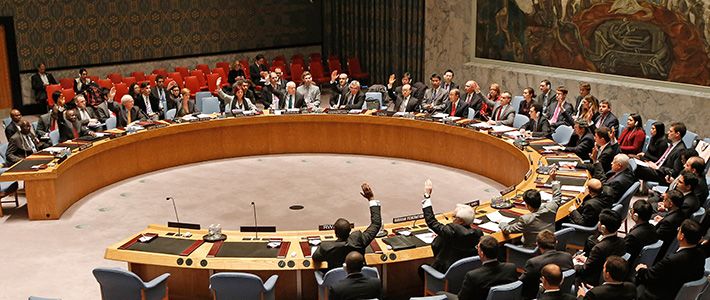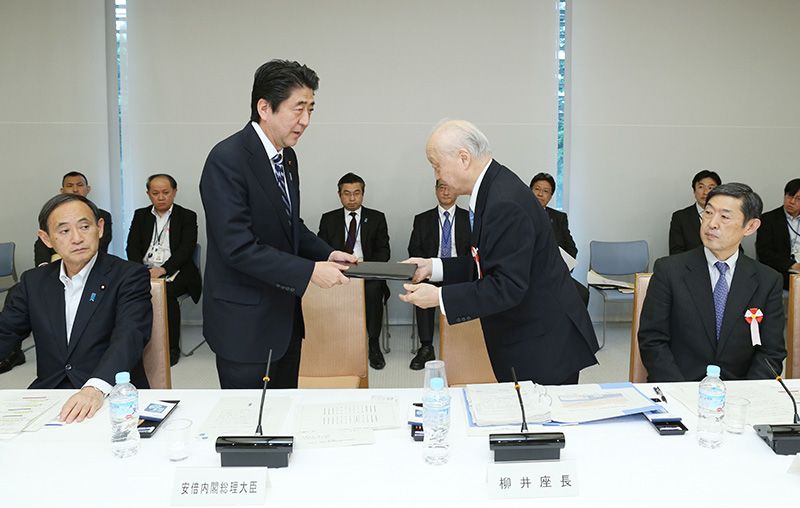
Bringing “Internationalism” Back
Politics- English
- 日本語
- 简体字
- 繁體字
- Français
- Español
- العربية
- Русский
On the afternoon of May 15, 2014, the Advisory Panel on Reconstruction of the Legal Basis for Security met at the Kantei (the prime minister’s office), and Chairman Yanai Shunji handed the panel’s report to Prime Minister Abe Shinzō. This was a historic event in two respects. First, the panel was originally established in April 2007, during the first Abe administration. Seven long years later the panel’s final report was complete. Second, the report includes a call for approving limited exercise of the right of collective self-defense, which has been completely forbidden under the existing interpretation of the Constitution by the Cabinet Legislation Bureau; if realized, this will mean a dramatic advance in international cooperation within Japan’s defense policy.
I became a member of this panel in September 2013, several months after it was reactivated under the second Abe administration. From my standpoint as a specialist in British diplomacy and defense policy, I feel the need to improve the legislation for Japan’s national security to make it more appropriate, and it was from this standpoint that I participated in the drafting of the panel’s report.
 Prime Minister Abe Shinzō receives the report of the Advisory Panel on Reconstruction of the Legal Basis for Security from the panel’s chairman, Yanai Shunji (president, International Tribunal for the Law of the Sea; former Japanese ambassador to the United States), at the Kantei on the afternoon of May 15, 2014. Seated on the right is the panel’s deputy chairman, Kitaoka Shin’ichi (president, International University of Japan), and on the left is Chief Cabinet Secretary Suga Yoshihide. (Photo: Jiji Press)
Prime Minister Abe Shinzō receives the report of the Advisory Panel on Reconstruction of the Legal Basis for Security from the panel’s chairman, Yanai Shunji (president, International Tribunal for the Law of the Sea; former Japanese ambassador to the United States), at the Kantei on the afternoon of May 15, 2014. Seated on the right is the panel’s deputy chairman, Kitaoka Shin’ichi (president, International University of Japan), and on the left is Chief Cabinet Secretary Suga Yoshihide. (Photo: Jiji Press)
Checking for Gaps in the Current Legal System for Security
When he launched the Advisory Panel on Reconstruction of the Legal Basis for Security in April 2007, Prime Minister Abe issued the following explanation of its purpose: “In light of the changing security environment surrounding Japan, it is necessary to reconstruct the legal basis for security so as to make it more effective and consistent with these changes. The ‘Advisory Panel on Reconstruction of the Legal Basis for Security’ . . . will be convened under the prime minister to examine, by looking at specific cases, issues of the Constitution, including those related to the right of collective self-defense.”
And in February 2013, when reactivating the panel under the second Abe administration, the prime minister stated: “In light of the increasingly severe security environment surrounding Japan, it is necessary to reconstruct the legal basis for security so that Japan can take appropriate responses to these changes.” Both statements noted the necessity of a legal system for security adapted to the major changes in the security environment.
Another major issue was to check for defects or gaps in Japan’s legal system for security. The right of collective self-defense was one issue in this connection, but it was not the sole topic of the panel’s deliberations. If there are defects or gaps in Japan’s legal system for security, it will not be possible to protect the lives and safety of the people in an adequate manner, nor will it be possible to make contributions for the sake of peace. It is not correct to position permitting exercise of the right of collective self-defense as the single purpose of the panel. The panel considered a broader range of issues.
Obstacles to International Cooperation from Rigid Adherence to Individual Self-Defense
So what sorts of problems were there in Japan’s legal system for security? I believe that the biggest problem is that various obstacles arose from the inappropriately excessive adherence by the Cabinet Legislation Bureau to the framework of the right of individual self-defense. Another problem is that the bureau’s thinking with respect to the right of collective self-defense differs from the standard international understanding. Let me explain what this means.
Excessive adherence to the right of individual self-defense means depriving Japan of room for cooperating with other countries. And in an age when globalization is progressing and international terrorist networks like al Qaeda conduct terrorism across national borders, broad international cooperation is necessary. International cooperation is also a key prerequisite to the response to cyberterrorism. In addition, in an age when military technology is developing and weapons of mass destruction are proliferating, it has become extremely difficult for any country to defend itself single-handedly. So international cooperation in security has become a major trend among democratic countries, as seen in the North Atlantic Treaty Organization and the European Union.
Also, UN peacekeeping operations have picked up, and humanitarian international solidarity in the form of “human security” and the “responsibility to protect” has become stronger in the post–Cold War world. It will not do for Japan alone to keep aloof from this solidarity. But under the current legal system for security, influenced by the aforesaid rigid interpretation of the Constitution by the Cabinet Legislation Bureau, Japan cannot conduct international cooperation going beyond individual self-defense to protect itself. This has given rise to obstacles in many connections.
Furthermore, the concept of ittaika (integration) with the use of force, which emerged from an answer to a question in the Diet by Cabinet Legislation Bureau Director General Ōmori Masasuke in 1997, has made international cooperation even more difficult. The concept refers to cases in which, even though Japan is not directly using force, its support activities are so closely related to the use of force by others that it is deemed to be using force itself. This unnatural legal interpretation by the director general of the Cabinet Legislation Bureau takes it that even when Japan is not using force, the provision of logistic support, such as transportation and medical care, is considered to be the use of force by Japan and therefore is prohibited.
This is an unnatural legal interpretation, adopted only by Japan and departing from the standard international interpretation. Were the US forces in Japan to act in South Korea’s defense in the event of a contingency on the Korean Peninsula, even logistic support from Japan involving the supply of fuel, medical goods, and the like to the US forces would be considered “exercise of the right of collective self-defense” and would therefore be prohibited under this concept as being the use of force by Japan, which is forbidden under the Constitution. I find it hard to understand how the supply of fuel and medical goods to the United States, our ally, can be taken to constitute “the use of force by Japan.”
The Cabinet Legislation Bureau’s About-Face on Peacekeeping Operations
These overly rigid legal interpretations by the Cabinet Legislation Bureau have made it impossible for Japan to cooperate effectively with NATO, to take part more broadly in United Nations peacekeeping operations, or to provide logistic support to US activities aimed at restoring peace. This posture, which decrees that Japan’s Self-Defense Forces may not be used for purposes other than Japan’s own defense, is excessively self-centered.
This is surely not in keeping with the ideals envisaged by our Constitution. The preamble of the Constitution declares, “We believe that no nation is responsible to itself alone.” And in the Supreme Court’s 1959 ruling on the Sunagawa incident, Chief Justice Tanaka Kōtarō attached a supplementary opinion in which he declared, “Whether it be for self-defense or for extending cooperation for the defense of another, it is now an accepted fact that each nation is charged with the duty of assuming its share of responsibility.” Chief Justice Tanaka called this the “spirit of international cooperation under the preamble to the Constitution.”
With reference to this “spirit of international cooperation,” the excessive adherence by the Cabinet Legislation Bureau to individual self-defense in its interpretation of the Constitution since 1981 can only be said to deviate from the original spirit of the Constitution. The Constitution expects the simultaneous pursuit of the spirit of pacifism and the spirit of international cooperation. A self-centered defense policy that takes Japan to be “responsible for itself alone” and neglects the responsibility to cooperate in the defense of other countries is contrary to the spirit of international cooperation under the preamble.
As of the 1960s, even the Cabinet Legislation Bureau judged on the basis of this sort of spirit of international cooperation that there would be no constitutional problem with participation by the SDF in UN peacekeeping operations. As revealed by research on recently disclosed documents from the Ministry of Foreign Affairs, the bureau took the position that what Article 9 forbids is the use of force by Japan itself and that this does not apply to the use of force at the will of the United Nations, meaning that participation by Japan in a UN military force based on the UN Charter would not violate the Constitution. It also judged that there would be no constitutional problem with participation in peacekeeping operations involving the use of force subject to certain conditions, such as approval by a UN resolution.(*1) But the move within the government to dispatch the SDF for peacekeeping ended up being shelved because of political developments. After that, the bureau moved toward total prohibition of the overseas dispatch of the SDF, and in 1981 it came out with its interpretation totally forbidding exercise of the right of collective self-defense.
Displaying “Common Sense” as a Law-Abiding Country
The panel’s report identifies the “principle of international cooperation” and “pacifism” as fundamental principles of the Constitution. This is an attempt to restore the principle of international cooperation to defense policy, where this principle had been established within the government up to the 1960s. As Prime Minister Abe has stressed with his repeated references to “proactive contribution to peace,” Japan needs to make a broader contribution to peace in the international community from now on.
In some quarters, the principles that are stated explicitly in the panel’s report have been ignored and concern has spread that exercise of the right of collective self-defense will turn Japan into a country that can wage war. But going to war is forbidden under both the Constitution of Japan (Article 9, paragraph 1) and the UN Charter (Article 2, paragraph 4). Japan is a country that stresses the rule of law, observing its Constitution and international law; it is inconceivable that it would go beyond the exercise of the right of self-defense and wage war itself. We are seeking a more effective legal system for security for the sake of preventing war and establishing peace.
Common sense is an indispensable element in discussions of national security. I hope that the panel’s report will be widely read, that the basic principles expressed in it will be understood, and that the Japanese people will achieve a deeper understanding of the move to create a sounder legal system for security.
(Originally written in Japanese on May 27, 2014. Title photo: The United Nations Security Council. Photo courtesy of the United Nations/AP/Aflo.)
(*1) ^ Murakami Tomoaki, “Kokuren Anzen Hoshō Rijikai to Nihon 1945–72 nen” (The UN Security Council and Japan, 1945–72), in Gurōbaru gabanansu to Nihon (Global Governance and Japan), ed. Hosoya Yuichi (Tokyo: Chūō Kōron Shinsha, 2013), pp. 200–201.
security PKO EU collective self-defense constitution Abe SDF cabinet US Yuichi Hosoya Kantei NATO UN